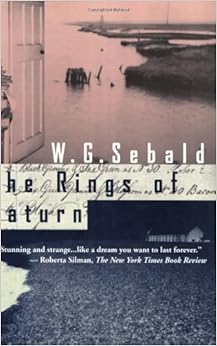







Product Details
Would you like to update product info or give feedback on images?.
|
The Rings of Saturn is his record of these travels, a phantasmagoria of fragments and memories, fraught with dizzying knowledge and desperation and shadowed by mortality. As in The Emigrants, past and present intermingle: the living come to seem like supernatural apparitions while the dead are vividly present. Exemplary sufferers such as Joseph Conrad and Roger Casement people the author's solitude along with various eccentrics and even an occasional friend. Indeed, one of the most moving chapters concerns his fellow German exile--the writer Michael Hamburger.
"How is it that one perceives oneself in another human being, or, if not oneself, then one's own precursor?" Sebald asks. "The fact that I first passed through British customs thirty-three years after Michael, that I am now thinking of giving up teaching as he did, that I am bent over my writing in Norfolk and he in Suffolk, that we both are distrustful of our work and both suffer from an allergy to alcohol--none of these things are particularly strange. But why it was that on my first visit to Michael's house I instantly felt as if I lived or had once lived there, in every respect precisely as he does, I cannot explain. All I know is that I stood spellbound in his high-ceilinged studio room with its north-facing windows in front of the heavy mahogany bureau at which Michael said he no longer worked because the room was so cold, even in midsummer..."
Sebald seems most struck by those who lived or live quietly in adversity, "the shadow of annihilation" always hanging over them. The appropriately surnamed George Wyndham Le Strange, for example, remained on his vast property in increasing isolation, his life turning into a series of colorful anecdotes. He was "reputed to have been surrounded, in later years, by all manner of feathered creatures: by guinea fowl, pheasants, pigeons and quail, and various kinds of garden and song birds, strutting about him on the floor or flying around in the air. Some said that one summer Le Strange dug a cave in his garden and sat in it day and night like St. Jerome in the desert."
In Sebald's eyes, even the everyday comes to seem extraterrestrial--a vision intensified in Michael Hulse's beautiful rendition. His complex, allusive sentences are encased in several-pages-long paragraphs--style and subject making for painful, exquisite reading. Though most often hypersensitive to human (and animal) suffering and making few concessions to obligatory cheeriness, Sebald is not without humor. At one point, paralyzed by the presence of the past, he admits: "I bought a carton of chips at McDonald's, where I felt like a criminal wanted worldwide as I stood at the brightly lit counter, and ate them as I walked back to my hotel." The Rings of Saturn is a challenging nocturne, and the second of Sebald's four books to appear in English. The excellent news is that his novel Vertigo is already slated for translation. --Kerry Fried --This text refers to the Hardcover edition.